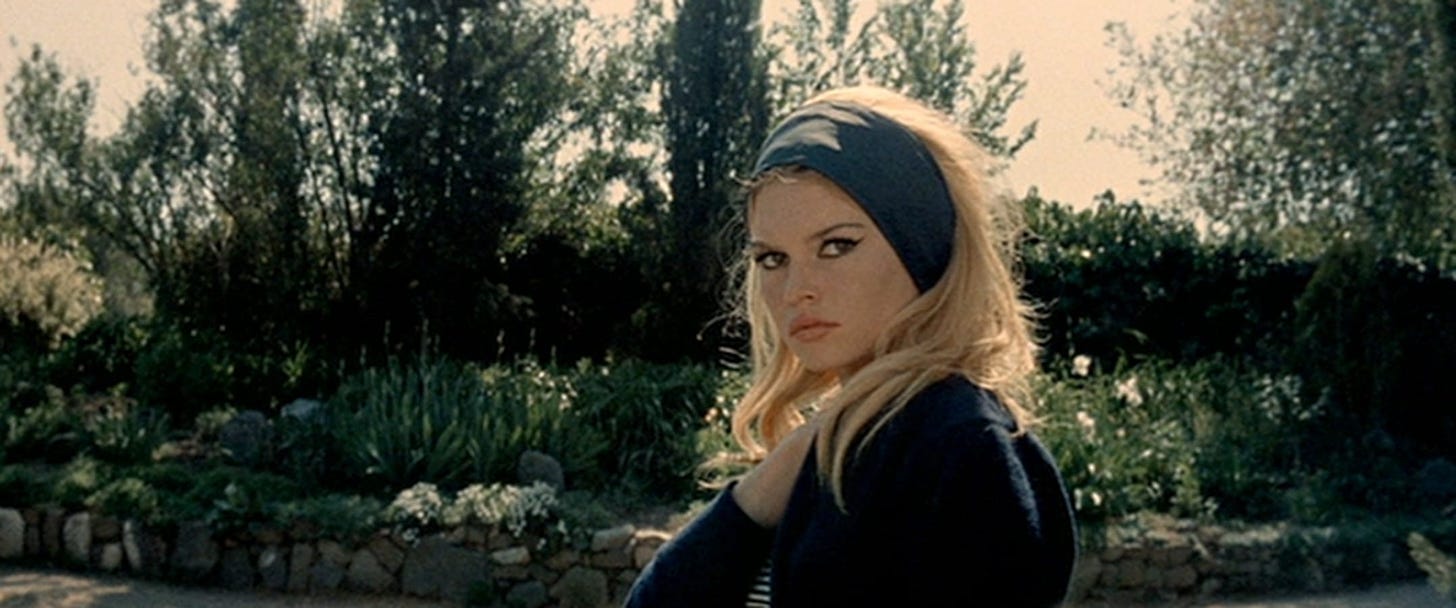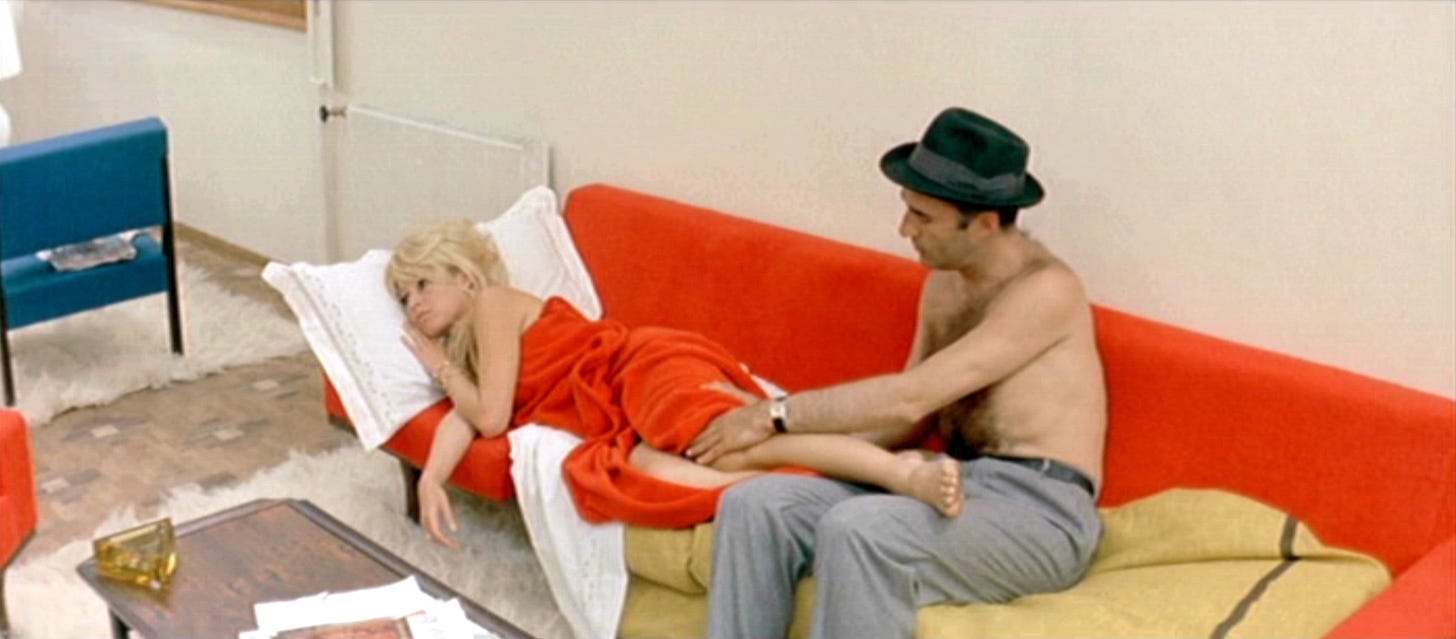The revolutionary beauty of Jean-Luc Godard's 'Contempt'
Remembering the late director through a film that at once seduces and challenges its audience.
“The cinema substitutes for our gaze a world more in harmony with our desires.” — André Bazin
Contempt opens with a shot of a shot. On the lot at Cinecittà studios in Rome, from a distance about 50 yards away, the camera peers up a slight incline to where a scene is about to unfold. We see that on the right side of the immense CinemaScope frame, a long set of tracks has been laid down, stretched all the way down to our vantage point. In lieu of traditional credits, a narrator tells us all the relevant information—that Contempt is based on the novel by Alberto Moravia, that it features Brigitte Bardot and Michel Piccoli, that it was printed in color by GTC Labs. Meanwhile, the tracking shot makes its way slowly towards us as we watch a key supporting character strolling along, reading a book.
The next scene, prompted by the film’s American co-producers, will give a commercial audience what it ostensibly wants: A shot of Bardot’s luscious body as she lies across the top of a bed, engaging in a bit of post-coital pillow talk. But the director, Jean-Luc Godard, has already pulled out the first of many rugs. We’ve been made aware that we’re watching a movie and everything that follows, therefore, exists in quotation marks, because we cannot deny the fundamental artifice that usually allows us to engage in the untroubled fantasy of the medium. Godard, making his sixth feature in the three years since upending modern cinema with his 1960 sensation Breathless, had never worked with the kind of resources allotted to him for Contempt or an international star of Bardot’s caliber. But none of that was going to stop him from getting into an argument.
Godard died yesterday at 91 in Switzerland, the last living member of a French New Wave movement that included François Truffaut, Éric Rohmer, and Claude Chabrol, but was perhaps defined by his work most of all, at least in its efforts to reinvent and reinvigorate the language of cinema itself. He had his devotees, to be sure, but his films were the opposite of ingratiating: You could not watch them passively and could rarely watch them comfortably. His death feels like the end of a long, fraught relationship, not unlike the marital spat that occupies the supersized second act of Contempt, with its prickly exchanges between a couple that knows each other all too well. There’s immense beauty and poetry in Godard’s work—never more so than in this luxuriant production—but not without obstacles. Contra to the Bazin quote above, which comes up in the opening too, Godard never wanted to cater to our desire for harmony.
Of the many quotes he left behind—he was Yogi Berra of cinema, in that respect—the most famous is “A story should have a beginning, a middle and an end, but not necessarily in that order.” Contempt is about as formal and orderly a film as Godard ever made, with three distinct acts, but he weaponizes this structural convention by making the second act as long as the other two put together, during which he confines his big CinemaScope production to a grueling two-hander in an apartment. The two hands are Paul (Piccoli), a playwright considering an offer to punch up a script for The Odyssey, and his glamorous wife Camille (Bardot), whose affection for him appears to be on the wane. Though Paul’s potential involvement in the film is just beginning, it feels like we’re entering his relationship with Camille in the middle of their final, decisive fight.
The title Contempt applies to many aspects of the film, including its own making, which Godard slyly references by casting Jack Palance as Jeremy Prokosch, a boorish American producer who loves the sound of his own voice almost as much as he likes bullying his director, Fritz Lang, who appears here under his real name. Jeremy insists that The Odyssey needs a German director, but his commercial reading of Homer’s epic poem does not align with Lang’s, whose attitude could be read as quiet intransigence or bone-deep resignation. (Quoting Bertolt Brecht, Lang says, “Each morning, to earn my bread, I go to the market where lies are sold and, full of hope, I line up alongside the other vendors.”) Jeremy is offering Paul a healthy chunk of money to punch up the script and add sex scenes, which Godard said his American co-producers obliged him to do to help sell his film around Bardot.
The money would be enough to finish the renovations on Paul and Camille’s apartment, but Paul senses his marriage is in jeopardy and doesn’t want to sell out with nothing to sell for. Earlier at Cinecittà, each of them had caught the other flirting—Camille with a leering Jeremy, Paul with the producer’s lovely assistant and translator (Giorgia Moll)—and their relationship is in too fragile a state to withstand even the hint of betrayal. What follows is not only a master class in mise-en-scène, but a strikingly credible portrait of a couple on the brink, full of exhausting stops-and-starts and breakdowns in communication. Anyone who’s ever gone through a breakup after a long relationship can see themselves in Paul and Camille, who know each other intimately enough to fall into a familiar, circular argument, but are nonetheless woefully out of step. Passive-aggression leads to aggression-aggression leads to the inevitable.
Or maybe not that inevitable. Godard respected his audience enough to toy with its expectations—for one, there’s a Chekhov’s gun here that never goes off—and rewrite the rules as he pleases, like a moment where Paul and Camille suddenly narrate their thoughts to the audience in diaristic terms. He also engages in a running meta-commentary about the woes of a commercial art form, where a Hollywood slickster like Jeremy can caterwaul about being “cheated” by Fritz Lang and not get laughed out of the room. (Lang keeps his cool. He’s probably met enough guys like Jeremy to ride out the tantrums and get what he wants anyway.)
As Paul frets over whether or not to take a hack job that he seems to believe might save his marriage, he delivers a brief soliloquy that could double as a statement of purpose for Godard’s career. “In today’s world, we have to accept what others want,” he says. “Why does money matter so much in what we do? In what we are? In what we become? Even in our relationships with those we love.” Money doesn’t save Paul and Camille’s marriage—if anything, it’s a catalyst for collapse and, finally, tragedy. Given resources like he’d never before had for Contempt, Godard bit hard on the hand that was feeding him, all while turning that budget into something challenging and beautiful. He may be one-of-a-kind, but we can learn from his example.






I'm not sure where else to put this so I'll put it here: One of the first things that came to mind was that scene from 1900 where the town crier (? - it's been a while) walks around yelling "Verdi's dead!" Some passings really do signal the end of an age.
How can I watch Contempt?